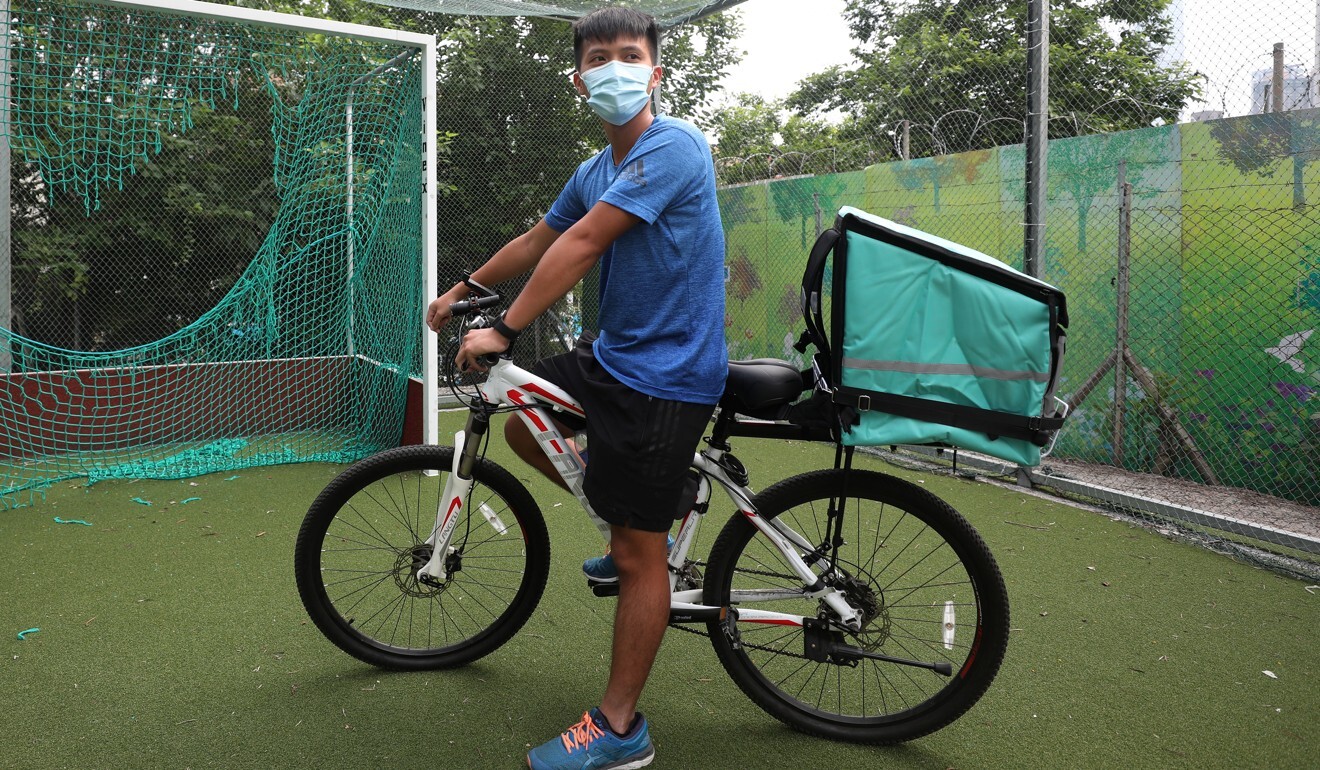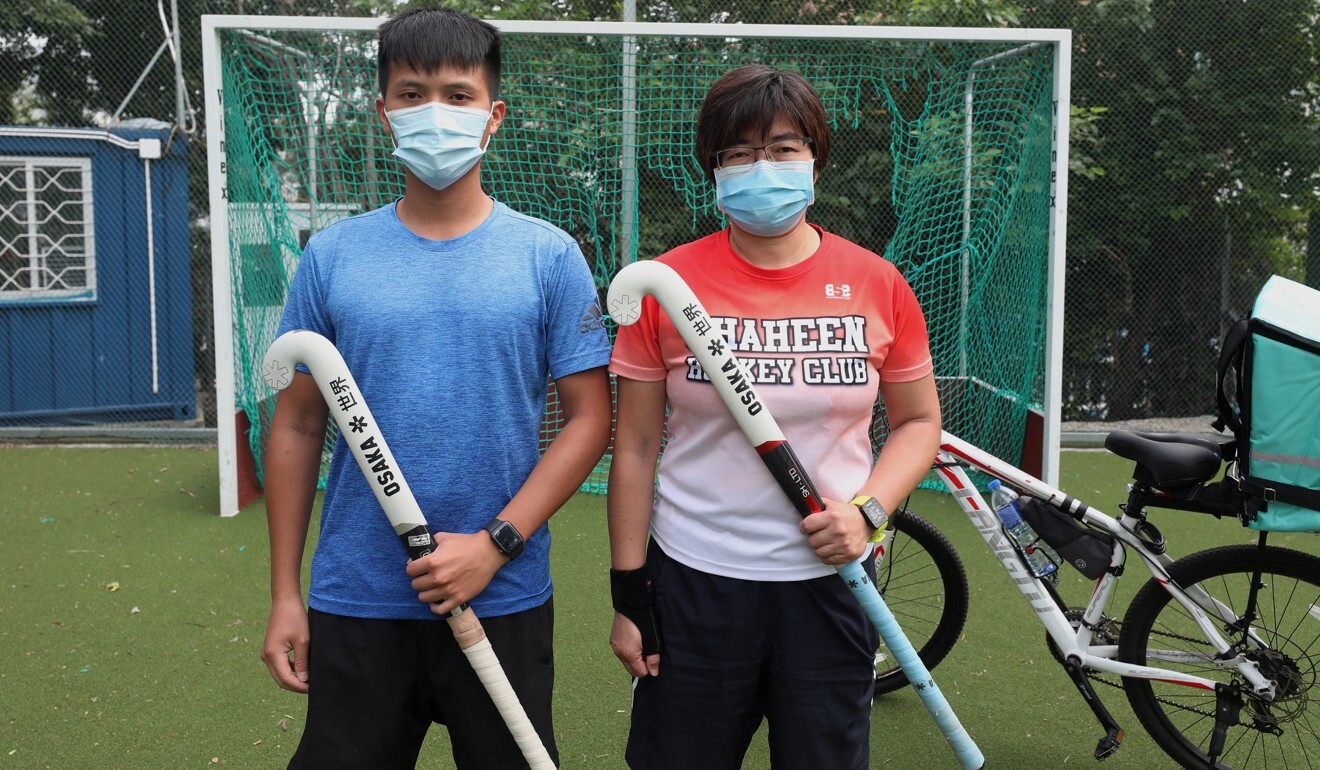
Hong Kong workers on unpaid leave struggle to find part-time jobs, unsure they qualify for pandemic wage subsidies
- Employers accused of stringing workers along, instead of paying their dues
- ‘Unscrupulous’ to force employees on indefinite unpaid leave, says unionist
With no games or income because of the coronavirus pandemic, Hong Kong hockey player Chris Tso Tsz-fung is working part-time delivering food.
Dressed in his sports outfit and trainers, the 26-year-old rides a bicycle across Tuen Mun in northwest Hong Kong, where he lives, during lunchtime and dinner time daily.
Tso works an average of four hours a day, delivering about 10 meals, earning about HK$30 for each. Some days, however, he chalks up only one delivery per hour.
A member of the Hong Kong men’s hockey team, he played in the 2018 Asian Games in Jakarta and has been a part-time coach for four years.

He was forced to stop coaching after the pandemic closed the city’s sports facilities, with games and training sessions suspended since February.
“I can’t keep having no income,” he says, explaining why he started delivering food last month.
Tso’s family lives on his father’s monthly income of about HK$10,000 as a driver, while his younger brother, 23, takes care of their sick mother.
He is among thousands of Hongkongers whose working lives have been disrupted by the pandemic.
Aside from those who are jobless, many employees have been told to take unpaid leave, leaving them with substantially reduced working hours and income.
Some have been asked to stay home a few days each week, or for half of each month, while others have been told to stay on unpaid leave indefinitely.
Latest statistics show that the unemployment rate increased to 3.7 per cent in the period from December 2019 to February 2020 – the highest in more than nine years – with 134,100 people out of work.
The rate of underemployment – referring to those in jobs working fewer than 35 hours a week, including those on unpaid leave – also increased to a five-year high of 1.5 per cent, with the number of underemployed rising from 47,300 to 59,100.
The coronavirus has killed more than 145,000 people and infected more than 2.1 million worldwide. Hong Kong has recorded more than 1,000 cases, four of whom have died.
According to a survey by the Hong Kong Retail Management Association, asking workers to take unpaid leave is the most popular strategy for businesses trying to save money.
The current job market is so bad I feel lucky to even have a job, despite the reduced hours and income
But some employers have been accused of neglecting their legal requirement to get workers’ consent first, and of threatening to dismiss those who refuse.
Workers on unpaid leave say it is a struggle to find part-time jobs that make up for their loss of income.
Chef Jin Lacson, 29, has been on unpaid leave since March, when the western restaurant where she worked suspended operations. Without her monthly income of HK$18,000, she has been looking for odd jobs, offering on Facebook to cook, shop, walk dogs or wash cars.
She has been getting two orders each day to cook dinner for families, making HK$100 an hour. Once she was hired to walk a dog for a family, for the same rate.
She spends her free time searching online for jobs as a chef, but the sparse offerings reflect the state of Hong Kong’s hard-hit restaurant scene. There are only one or two online advertisements each day, and her applications have received no reply.
“There are a lot of jobless people competing for few jobs,” says Lacson, an IT graduate who has spent seven years as a chef. She says she is ready to change careers, if it means a stable job.
A survey conducted by Bill Tang Ka-piu, a former Legislative Council member for the labour constituency, with the Hong Kong Federation of Trade Unions between April 11 and 13 found that 25 per cent of about 1,800 respondents took unpaid leave during the pandemic.
Almost 240 said they were forced to go on unpaid leave indefinitely.
Most of those on unpaid leave are working in the worst-affected sectors of construction, transport, retail, accommodation, and food services.
Peace Wong Wo-ping, chief officer of social security and employment at the Hong Kong Council of Social Service, says employers suffer no cost when they keep employees on unpaid leave, whereas employees face hardship.
These workers do not receive severance or long-service payments because they have not been dismissed, yet they are not free to seek other full-time jobs, he says.
Ho Hung-hing, organising secretary of the Catering and Hotel Industries Employees General Union, says forcing employees to take “indefinite unpaid leave is unscrupulous”.
Instead of keeping employees hanging on, bosses ought to make proper dismissal arrangements with severance or long-service payments the workers are entitled to. These payments can be substantial for those who have spent years on the job.
Ho also hopes the government and employers will provide subsidies as soon as possible to workers forced to take a few days of unpaid leave weekly or monthly.
Waitress Ada Lui, in her 40s, was told by her boss to take 15 days’ unpaid leave in April because of poor business at the Chinese restaurant where she worked.
They are in a very precarious position. Should they look for a new job, or wait until June to find out whether they benefit from the relief fund
Having her monthly income of HK$20,000 halved added to her worries, as her husband lost his job as a security guard three months ago and has not been able to find new work.
With a 16-year-old son and a 14-year-old daughter to support, Lui has been searching for part-time work, with little success.
“The current job market is so bad,” she says. “I feel lucky to even have a job, despite the reduced hours and income.”
The Hong Kong government’s HK$137.5 billion second round of pandemic relief measures includes HK$80 billion to pay 1.5 million workers 50 per cent of their salaries for six months, capped at HK$9,000 a month.
The money will be distributed to employers by June, and they have been warned they face cash penalties or even criminal liability if they fail to fully transfer the wage subsidies to their employees.
Lacson and Lui do not know yet if they qualify for the payment.

Labour Party lawmaker Fernando Cheung Chiu-hung says the employment support scheme is poorly designed and can be abused by employers, leaving employees currently on unpaid leave in a dilemma.
“They are in a very precarious position,” he says. “Should they look for a new job, or wait until June to find out whether they benefit from the relief fund?”
He says the government should funnel its help directly to affected employees.
Hockey player Tso does not know yet if he will qualify for help. For now, he is counting the days until life returns to normal because he hopes to get back to work and misses the game he has played since he was 10.
“I haven’t played hockey for a month. I hope the pandemic will be over soon, so I can return to the field,” he says.

